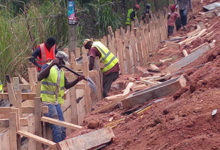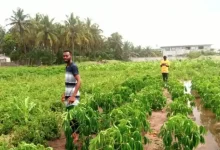Lack of evidence-based development policies is one of the major challenges confronting Ghana’s efforts in achieving inclusive and equitable development across the country, Dr Mamudu Akudugu, Deputy Director of the Institute of Interdisciplinary Research and Consultancy Services (IIRaCS) at the University for Development Studies (UDS) has said.
“One of the biggest problems we have in the country in terms of promoting inclusive development is the way that policies are made. Most of the policies are not based on evidence, and if you make policies that are not based on evidence, they would not achieve the desired results,” he said.
Dr Akudugu said this during Ghana Inclusive Development Research Network (GIDRN) stakeholder and media engagement on inclusive development in Bolgatanga in the Upper East Region on Monday.
GIDRN is a collaborative initiative by the IIRaCS and the United Nations Emergency Fund (UNICEF) to support research on inclusive development in Ghana through capacity building, small grants, networking and mentorship opportunities for researchers across the country.
The partnership is to support national dialogue on how evidence-based research could be used by policy makers to formulate the right policies and programmes that would reduce poverty as well as bridge the inequality gaps, so as to promote holistic, sustainable and inclusive development at all levels.
Dr Akudugu, who is also the National Coordinator for GIDRN, stated that research was central in Ghana’s quest to achieving the 17 Sustainable Development Goals (SDGs) and the African Union Agenda 2063.
“For example, we say we want to promote inclusive in health, what are the underlined causes of people not having access to quality health services, where is the evidence? So we need to start thinking of making policies that are grounded on robust research findings to enable us address the challenges,” he said.
Dr Akudugu explained that the district league table revealed vast disparities among the districts across the country in terms of the development indicators, and urged stakeholders in policy making positions to always make good use of accurate research findings to address the challenges confronting the deprived districts, particularly those in the north.
The Executive Director of IIRaCS, Dr Abdulai Abubakari, explained that over the years, there had been unequal distribution of development resources and most of the decisions were taken by the central government without taking into consideration the implementing agencies at the local levels.
He said GIDRN aims to create a linkage between research institutions like the universities and decision makers to employ the evidence produced by these research institutions to formulate policies that would address development, inequality and exclusive challenges.
In a speech read on his behalf, Professor Gabriel Ayum Teye, Vice Chancellor of the UDS, admonished the various Municipal and District Assemblies to mainstream the activities of GIDRN into their development budgets to sustain the initiative for effective and sustainable development.
The Upper East Regional Minister, Ms Tangoba Abayage, lauded the efforts of the UDS and UNICEF for implementing the GIDRN to promote inclusive development, and said it would help to implement policies that would address critical development issues that made the region one of the poorest in the country.
“Issues of quality and access to education, health, water and sanitation, mental health and child protection are basic pre-requisites for the attainment of the SDGs, and therefore our overall development,” she stressed.
FROM SAMUEL AKAPULE, BOLGATANGA







